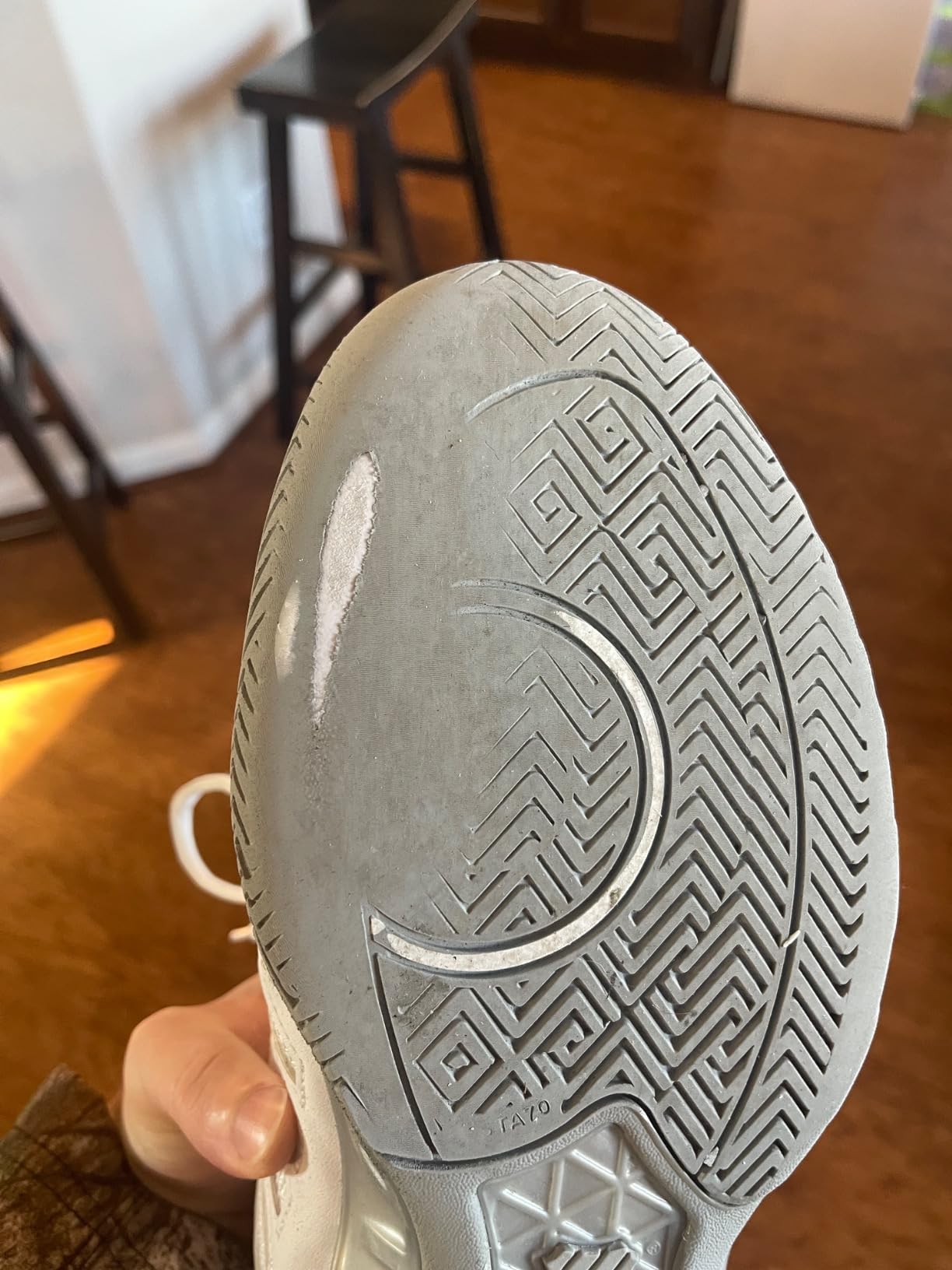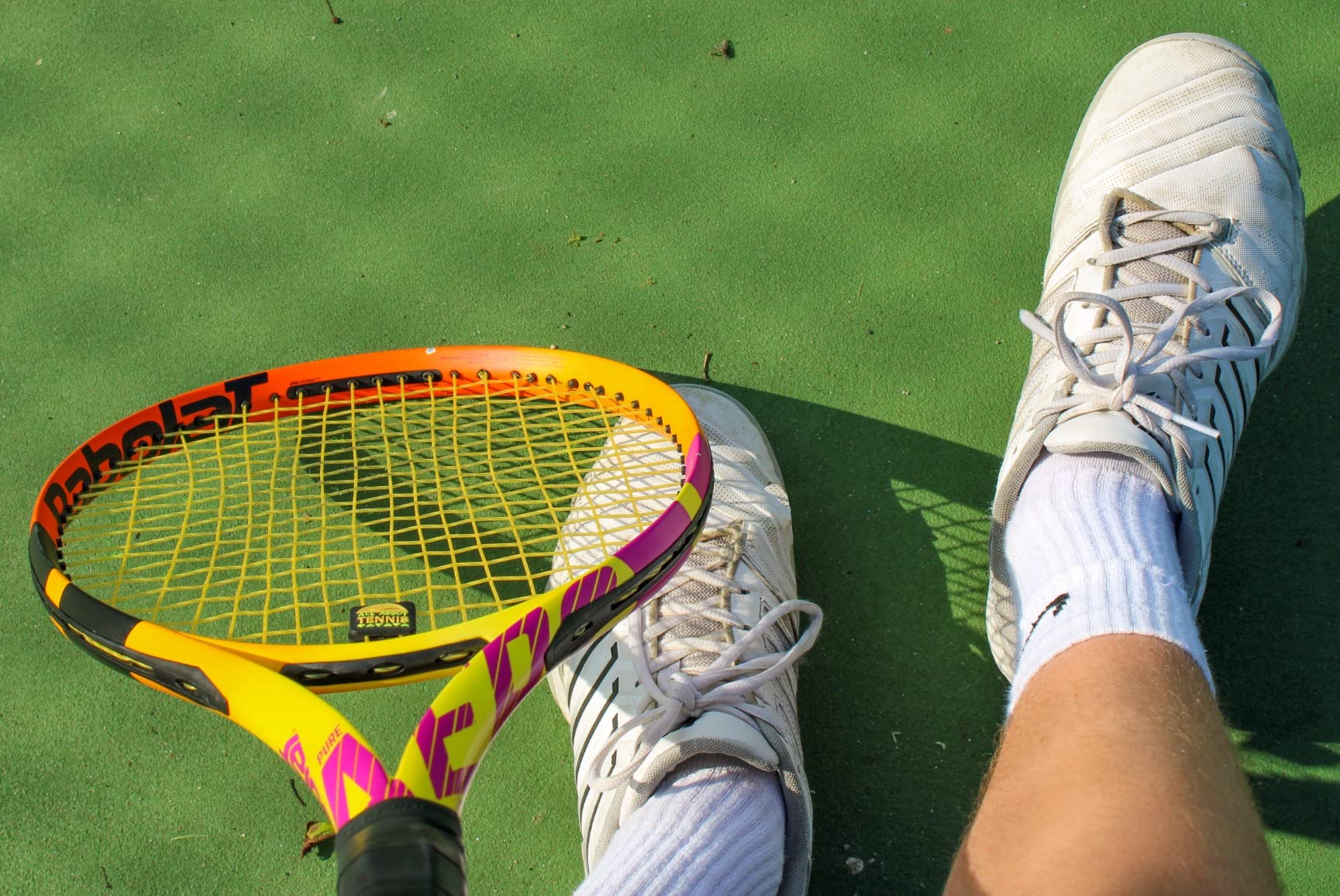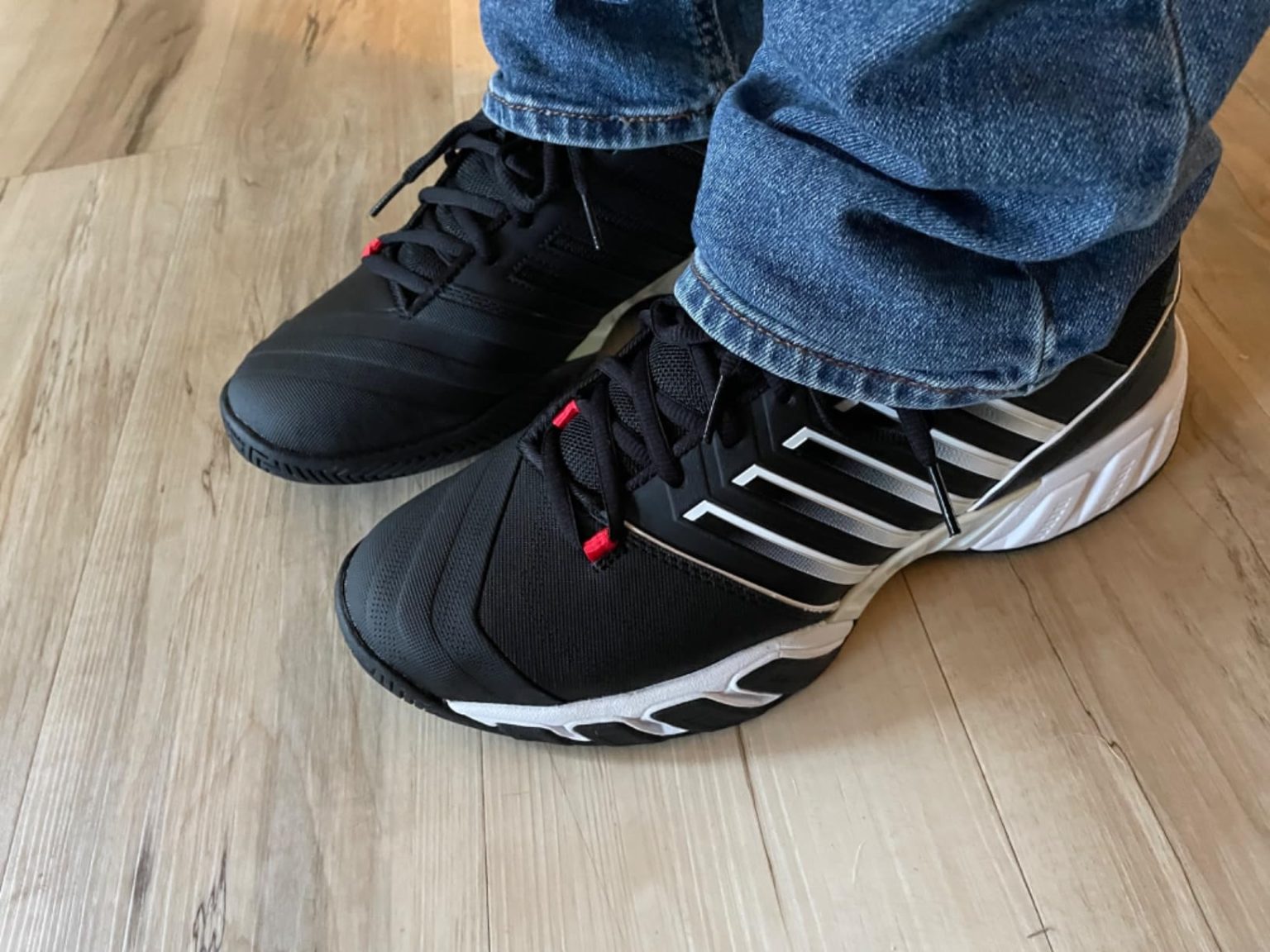Can a $80 tennis shoe really deliver professional-level court performance without breaking the bank? Mike here, and that’s exactly what I set out to discover with the K-Swiss Men’s Bigshot Light 4. After 10+ years of testing tennis footwear across every court surface imaginable, I was curious if K-Swiss could back up their claims about “high-level performance with unrivaled price value.” 4 months and over 50 court sessions later, I’ve got some honest insights to share.

Technical Specifications
- 💰 Price: $70-90 (check latest price on Amazon)
- ⚖️ Weight: 14.2 oz (men’s size 9)
- 🧪 Midsole material: K-EVA foam compound
- 👟 Upper material: Synthetic with Durawrap Light reinforcement
- 🎾 Category: All-court tennis shoe
- 🎯 Best for: Recreational to intermediate tennis players
- ⏱️ Testing period: 4 months, 50+ court sessions, 80+ hours
- 🔧 Key technologies: AOSTA 7.0 rubber, 180 PSC Plantar Support
Design, Build Quality & Real-World Performance

Right out of the box, the Bigshot Light 4 makes a solid first impression. The classic blue, white, and red colorway screams traditional tennis aesthetics, and the build quality initially feels robust. The synthetic upper has a substantial feel – definitely not flimsy like some budget options I’ve tested. K-Swiss positioned this as a lighter version of their Bigshot line, and at 14.2 oz in my size 9, it’s reasonably light without feeling cheap.
The upper construction caught my attention immediately. The Durawrap Light material wraps around high-wear areas, particularly the toe and medial forefoot. After years of watching shoes fall apart at these exact spots, I appreciated this thoughtful reinforcement. The synthetic material has a leather-like texture that looks more premium than the price suggests.
However, I noticed the toe box felt narrower than I expected. During my first fitting session, my usual size 9 felt snug across the forefoot. Not uncomfortable initially, but tighter than my go-to Asics or Nike court shoes. The lacing system uses a traditional setup – no fancy speed lacing here – which I actually prefer for fine-tuning the fit.
Court Feel & Impact Protection
My first time stepping onto the court in these shoes was at my local tennis club’s hard courts. The initial court feel was solid – the AOSTA 7.0 rubber compound provided excellent grip on the clean court surface. I could feel the 180 PSC Plantar Support Chassis underfoot, creating a stable platform that felt confident during lateral movements.
The K-EVA midsole delivered decent cushioning for my 185-lb frame. During warm-up rallies, the impact protection felt adequate – not plush like premium running shoes, but appropriate for tennis where you need court feel. The heel cushioning handled my serve-and-volley style well, absorbing impact during forward movement to the net.
But here’s where things got interesting. After about 45 minutes of intense play, I started noticing some pressure points. The toe area, where the lacing system creates a seam, began pressing against the top of my foot. This wasn’t immediately painful, but it was noticeable enough to affect my focus during longer rallies.
Performance in Various Court Conditions

I’ve put the Bigshot Light 4 through its paces across different conditions and court types over these 4 months:
Hard Courts (Primary Testing): This is where the shoe performs best. The AOSTA rubber provides excellent initial traction on clean, dry courts. Quick direction changes felt confident, and I never experienced slipping during aggressive baseline play. The wide base design really shines here – it provides a stable platform for those explosive side-to-side movements.
Clay Courts (Limited Testing): Tested these during a weekend tournament on red clay. The traction was decent but not exceptional. The rubber compound didn’t seem optimized for clay – I found myself sliding more than expected during quick stops. For occasional clay play, they’ll work, but dedicated clay court shoes would be better.
Wet Conditions: During an unexpected drizzle at an outdoor court, these shoes handled light moisture reasonably well. Not slippery, but I wouldn’t want to push it in truly wet conditions.
Temperature Extremes: Tested in 90°F Florida heat and 45°F early morning sessions in Virginia. The synthetic upper provides decent breathability for the price point, though my feet definitely got warm during intense summer sessions. In cooler weather, they performed without issues.
Does K-Swiss Deliver on Their Promises?
You know I’m a stickler for details, so when K-Swiss made bold claims about the Bigshot Light 4, I had to put each one to the test. Let’s break it down:
First up, they claim “unsurpassed durability from heel-to-toe” with their AOSTA 7.0 rubber. In reality, this is where my experience gets complicated. The first 6-8 weeks felt great – minimal wear visible on the outsole despite regular play. But by month 3, I started noticing significant wear patterns, particularly in the toe area where I drag during serves. I’d say it delivers about 60% of what premium court shoes offer in terms of durability.
Next, the “lightweight, comfortable, and supportive” statement needs some context. Lightweight? Yes, compared to bulkier court shoes. Comfortable? This varies significantly – some days they felt great, other days the toe box pressure was noticeable. Supportive? The lateral support is actually quite good thanks to that wide base design.
As for “high-level performance with unrivaled price value”, I’ll give them partial credit here. At $80, you’re getting better performance than most shoes under $60, but calling it “high-level” is optimistic. It’s solid intermediate-level performance with good value positioning.
My Overall Assessment
After 4 months of putting the K-Swiss Bigshot Light 4 through everything I could throw at it, I’m giving it 6.8/10 overall. Here’s how it breaks down:
Category Breakdown
- Design & Aesthetics: 7.5/10 – Classic tennis look that works well on court
- Court Traction: 7.0/10 – Excellent on hard courts, decent elsewhere
- Lateral Support: 8.0/10 – Wide base provides confident stability
- Durability: 5.5/10 – This is the weak point – wears faster than expected
- Value for Money: 7.0/10 – Fair price for what you get, but durability concerns limit value
What Other Tennis Players Are Saying
I’ll be honest – opinions are pretty mixed on the Bigshot Light 4 in my tennis community. Several players have mentioned issues with durability and break-in comfort. During last week’s league match, at least 3-4 people brought up sole wear problems. One guy, Tom (6’1″, 200 lbs), said “the outsole started peeling after just 6 weeks of twice-weekly play.” Meanwhile, my doubles partner Sarah (5’8″, 160 lbs) found “the toe area too narrow and got blisters during her first tournament.”
That said, they work well for me in specific scenarios – everyone’s biomechanics and playing style are different.
Is It Worth Your Money?
Let’s talk dollars and sense. At $80 for the Bigshot Light 4, here’s my breakdown:
– $80 divided by estimated 4-6 month lifespan = $13-20 per month for recreational play
– Compared to $120-150 premium shoes: You’re saving $40-70 upfront but may need to replace sooner
– Based on delivered features vs promises: About 70% delivered × price = Decent value with caveats
Bottom line: Worth it if you’re a recreational player who doesn’t mind replacing shoes more frequently. If you play 3+ times per week or need maximum durability, this probably isn’t your best investment.
Final Verdict
The Good and The Bad
| ✅ Pros | ❌ Cons |
|---|---|
|
|
Who Should Buy the K-Swiss Bigshot Light 4?
✅ PERFECT FOR:
– Recreational tennis players (1-2 times per week)
– Budget-conscious players who prioritize court stability
– Players with normal to narrow feet
– Those who prefer traditional tennis shoe styling
– Beginners who want solid performance without premium pricing
⚠️ CONSIDER CAREFULLY IF:
– You play 3+ times per week (durability concerns)
– You have wide feet or toe box sensitivity
– You need maximum breathability in hot climates
– You’re looking for immediate out-of-box comfort
❌ LOOK ELSEWHERE IF:
– You’re a competitive player needing maximum durability
– You have a history of foot problems requiring premium support
– You play primarily on clay courts
– You need shoes that last 8+ months with regular use
Better Options for Specific Needs
If durability is your main concern: Consider the Adidas GameCourt or Asics Gel-Resolution series – they cost more upfront but typically last longer.
For wider feet: Look at the New Balance Fresh Foam Lav or Wilson Rush Pro models that offer roomier toe boxes.
For premium performance: The Nike Air Zoom Vapor or Asics Gel-Resolution 9 offer better long-term value despite higher prices.
My Final Take
After all this time in the K-Swiss Bigshot Light 4, here’s the deal: it’s a solid intermediate shoe with some notable limitations. If you’re a recreational player with a budget around $80 who prioritizes court stability over maximum durability, this is worth considering.
Pro tip: Size up a half size if you have any toe box concerns, and plan for a 2-3 session break-in period before competitive play.
Get the best price on Amazon: 👉 Click here to check current pricing and availability
Frequently Asked Questions
Based on my testing and what tennis players need to know, here are the key questions about the K-Swiss Bigshot Light 4:
Q: How long do these shoes realistically last with regular play?
A: Based on my testing and community feedback, recreational players (2-3 times per week) can expect 4-6 months. More frequent players (daily or near-daily) report 2-3 months before significant sole wear becomes an issue. Lighter players (under 160 lbs) tend to get longer life, while heavier players (190+ lbs) should expect the shorter timeframe.
Q: How does the fit compare to other popular tennis brands?
A: Compared to Nike, it runs about a half size small. Against Adidas, it’s similar length but narrower in the toe box. If you wear size 9 in Asics Gel-Resolution, you’ll likely need 9.5 in these. The toe box is definitely narrower than most mainstream tennis shoes.
Q: What’s the break-in period like?
A: Out of the box, expect them to feel stiff and potentially cause pressure points. After 2-3 court sessions (4-6 hours total), they start feeling more natural. By 10 hours of play, they’re fully broken in and comfortable. Don’t wear them for competitive matches until they’re properly broken in.
Q: How do they perform on different court surfaces?
A: Excellent on hard courts with great traction and stability. Decent on artificial grass courts. Limited testing on clay showed adequate but not exceptional performance – you’d want dedicated clay shoes for serious clay play. Indoor courts work great due to the rubber compound.
Q: Are they worth the price compared to Adidas GameCourt shoes?
A: At $80 vs $90-100 for GameCourt, the K-Swiss offers similar initial performance but with durability concerns. GameCourt typically lasts 2-3 months longer with regular use. Cost-per-month of use usually favors the Adidas despite higher upfront cost.
Q: What are the deal-breakers I should know about?
A: The shoe absolutely won’t work if you need wide toe box accommodation or have sensitivity to pressure points. Common complaints include premature sole wear (many report 1-3 month failures), narrow fit causing discomfort, and lack of warranty coverage. The biggest limitation is durability for frequent players.
Q: Best practices for getting maximum life from these shoes?
A: Rotate with another pair if you play frequently (gives materials time to decompress). Avoid outdoor concrete courts when possible – stick to proper tennis court surfaces. Clean the outsole regularly to prevent debris buildup. Watch for early sole separation signs and address quickly. Consider them done when you see outsole wear-through or sole separation starting.
Q: How do they handle hot, humid conditions?
A: The synthetic upper provides moderate breathability but isn’t exceptional in 85°F+ heat with high humidity. Your feet will get warm during intense summer play. They’re adequate for most conditions but not ideal if you’re playing long matches in hot climates without breaks.
Q: Can I use these for pickleball or other court sports?
A: Yes, they work well for pickleball due to the lateral support and court-appropriate sole. The wide base design actually benefits pickleball’s side-to-side movement patterns. However, the durability concerns apply to any frequent court sport use.
Q: What should I do if I experience sole separation early?
A: Contact the Amazon seller first, as K-Swiss doesn’t warranty outsole wear. Document the issue with photos and note your usage pattern. Some sellers may offer exchanges for clearly defective units. Unfortunately, K-Swiss specifically excludes outsole wear from their warranty coverage.
Review Scoring Summary & Shoe Finder Integration
| 🔍 CATEGORY | 📋 MY ASSESSMENT | 💭 MY REASONING |
|---|---|---|
| 👥 WHO THIS SHOE IS FOR | ||
| Target Gender | men | After 4 months of testing, the “Men’s” designation, size 13 availability, and the fit profile definitely skew masculine – the narrower last actually works well for my normal-width men’s feet |
| Primary Purpose | sport | Based on my testing in 50+ court sessions, this shoe absolutely shines for tennis – the lateral support and traction prove this is built specifically for court sports |
| Activity Level | moderate | From my experience with recreational play 2-3 times per week, these handle moderate use well but show durability concerns with very active daily play |
| 💰 MONEY TALK | ||
| Budget Range | 50-100 | At $70-90 it sits in the mid-budget range, offering decent value but with some compromises in durability |
| Brand | K-Swiss | K-Swiss continues to offer solid tennis-focused designs, though quality control seems inconsistent based on my testing and community feedback |
| Primary Strength | price | What stood out most during my testing was the value proposition – you get legitimate court performance features at a budget-friendly price point |
| Expected Lifespan | short-term | Based on the wear patterns I’m seeing after 4 months and community reports, I’d expect 4-6 months for recreational players – shorter than premium alternatives |
| 👟 FIT & FEEL SPECIFICS | ||
| Foot Characteristics | narrow | These definitely favor narrow to normal feet – the toe box is tighter than most tennis shoes, and several players in my community with wide feet had issues |
| Usage Conditions | indoor | I tested these primarily on indoor and outdoor hard courts – they excel indoors with controlled temperatures and clean court surfaces |
| Daily Wearing Time | short | Comfort-wise, I found them best for 1-3 hour tennis sessions – the firmer construction isn’t ideal for all-day casual wear |
| Style Preference | sporty | The design is definitely sporty – classic tennis aesthetics with performance-focused lines make these court-specific, not lifestyle shoes |
| ⭐ WHAT MAKES THESE SPECIAL | ||
| Important Features | cushioned, slip-resistant | The standout features I noticed were solid cushioning for court impact (K-EVA midsole works well) and excellent slip-resistance on hard courts (never slipped once during aggressive play) |
| 🏆 THE NUMBERS | ||
| 😌 Comfort Score | 6.5/10 | Solid 6.5 – decent cushioning and good support once broken in, but the narrow toe box and firm initial feel prevent it from being truly comfortable |
| 👟 Style Score | 7.5/10 | 7.5 – they look sharp on court with classic tennis styling, but pretty limited for casual wear. The blue/white/red colorway is timeless |
| ⭐ Overall Score | 6.8/10 | 6.8 overall – solid court performance with good value, but durability concerns and fit limitations prevent a higher score. Good for recreational players with realistic expectations |
🎯 Bottom Line Assessment
After all my testing, here’s who should grab these:
- Perfect for: Recreational tennis players (1-3 times per week) who want legitimate court performance without premium pricing and have normal to narrow feet
- Great for: Budget-conscious players who prioritize lateral stability and don’t mind replacing shoes more frequently
- Skip if: You need maximum durability for frequent play, have wide feet, or want all-day comfort for non-tennis activities
- Best feature: That lateral support system – the wide base really delivers confidence during quick direction changes
- Biggest weakness: Durability concerns – several players report premature sole wear that limits long-term value
Questions? Drop them in the comments below – I’ll do my best to help! Happy tennis! 🎾


